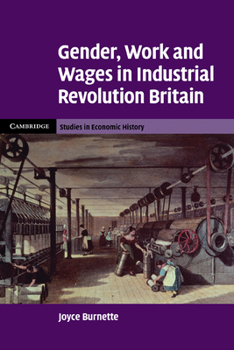Gender, Work and Wages in Industrial Revolution Britain
(Part of the Cambridge Studies in Economic History - Second Series Series)
Select Format
Select Condition 
Book Overview
A major study of the role of women in the labour market of Industrial Revolution Britain. It is well known that men and women usually worked in different occupations, and that women earned lower wages than men. These differences are usually attributed to custom but Joyce Burnette here demonstrates instead that gender differences in occupations and wages were instead largely driven by market forces. Her findings reveal that rather than harming women competition actually helped them by eroding the power that male workers needed to restrict female employment and minimising the gender wage gap by sorting women into the least strength-intensive occupations. Where the strength requirements of an occupation made women less productive than men, occupational segregation maximised both economic efficiency and female incomes. She shows that women's wages were then market wages rather than customary and the gender wage gap resulted from actual differences in productivity.
Format:Paperback
Language:English
ISBN:0521312280
ISBN13:9780521312288
Release Date:June 2011
Publisher:Cambridge University Press
Length:390 Pages
Weight:1.15 lbs.
Dimensions:0.8" x 6.0" x 9.0"
Customer Reviews
0 rating





